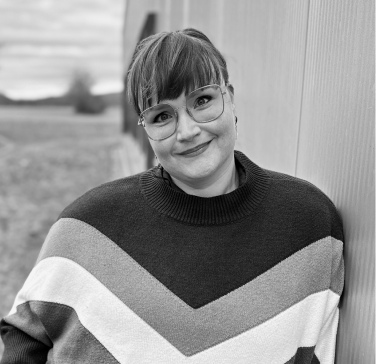Module 2: DESIGNING FOR NEURODIVERSITY
The overall focus of Designing for Neurodiversity will be to explore more inclusive principles and frameworks of digital design to inspire and teach designers to be more aware of cognitive diversity. In this module, we will more specifically delve into the understanding of how to design for neurodiversity aiming to provide you with knowledge and insights to design digital products that cater to a wide range of neurological differences. You will gain more knowledge on how to design for users with neurological differences, such as ADHD, dyslexia, autism and other conditions which are all natural variations of the human experience but often overlooked within a design process.
Speaker 01: Katrin Suetterlin
About Katrin
Katrin is a UX Content Strategist, Architect and Consultant. She is determined to remove barriers–within products and between silos. She has been an on and off freelance writer for almost 20 years, a language teacher, and also a performance marketer and SEO and social media specialist, until she has found her calling in the field of all things experience design, no matter which industry or setting.
Katrin is a passionate public speaker, apart from inclusive design conferences and UX content panels and she has been a guest in several podcast episodes. In German or English, she is constantly advocating for the advancement of neuro-inclusion in digital designs.
Topic
Intersectionality is the overarching term we all need to make the foundation of our design principles now, to be truly inclusive. Making people feel like they belong and they have equity is a central focus of designing for neurodiversity, as much as gender, culture and more.
In her session, Katrin wants to ignite a spark in the participants, to think beyond what design standards provide in the form of accessibility standards. Through motivation and awareness, Katrin seeks to instill the sense of true inclusion in her audience. Supporting all participants in their needs for a better design practice, Katrin’s session provides hand-on tools and lived experiences.
Exploring a continuously expanding vision of inclusive design principles is the way, and this session wants to be your starting point for a journey of learning about neuro-inclusion and neurodivergent audiences. Learn how research lays out that path in front of you, and bring all your questions and wonderings to this session. This is a collaborative endeavour, a dialogue, not a monologue.

Speaker 02: Will Soward
About Will
Will works creatively in a diverse field of digital media. Formerly a commercial photographer and front-end website designer/developer providing digital solutions to an international client base. In 2008 Will transitioned into education as a Creative Digital Technologies teacher for adults with learning disabilities, then into higher secondary education as a lecturer in Interactive Design. After relocating to New Zealand in 2012, to tutor a Bachelor of Arts programme, he joined eCampus NZ in 2016 as a core developer and Learning Media Designer; today he is the Lead Learning Experience Designer for Tait Communications.
Topic: Digital accessibility and accessible learning design for neurodiverse users
In this workshop, participants will delve into the fundamental principles and practical applications of accessible User Interface (UI) design, with a specific focus on enhancing the online learning experience for neurodivergent users. The workshop aims to equip designers, educators, and anyone involved in creating digital content with the knowledge and skills needed to make their platforms more inclusive. Through a variety of insightful presentations, hands-on exercises, and real-world case studies, attendees will gain a greater understanding of the diverse needs of neurodivergent learners and discover how to implement accessible design principles for everyone.
The workshop will emphasize practical approaches to meeting accessibility standards, providing participants with quick wins in UI design that have a significant impact on neurodiverse users’ success in online learning environments. Additionally, the workshop will highlight unexpected advantages that emerge when designers prioritize inclusivity, such as improved user engagement, better learning outcomes, and a broader appeal to a diverse audience. By the end of the workshop, participants will be equipped with the tools and insights needed to create digital interfaces that not only meet accessibility standards but also cultivate a digital environment where neurodivergent learners succeed.

